
"Lucy in the Sky with Diamonds" is a song by the English rock band the Beatles from their 1967 album Sgt. Pepper's Lonely Hearts Club Band. It was written primarily by John Lennon with assistance from Paul McCartney, and credited to the Lennon–McCartney songwriting partnership. Lennon's son Julian inspired the song with a nursery school drawing that he called "Lucy – in the sky with diamonds". Shortly before the album's release, speculation arose that the first letter of each of the nouns in the title intentionally spelled "LSD", the initialism commonly used for the hallucinogenic drug lysergic acid diethylamide. Lennon repeatedly denied that he had intended it as a drug song, and attributed the song's fantastical imagery to his reading of Lewis Carroll's Alice in Wonderland books.
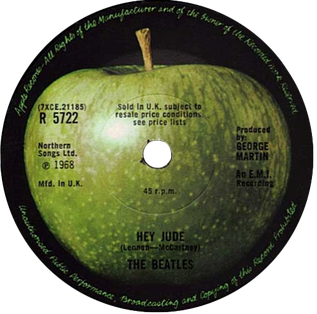
"Hey Jude" is a song by the English rock band the Beatles that was released as a non-album single in August 1968. It was written by Paul McCartney and credited to the Lennon–McCartney partnership. The single was the Beatles' first release on their Apple record label and one of the "First Four" singles by Apple's roster of artists, marking the label's public launch. "Hey Jude" was a number-one hit in many countries around the world and became the year's top-selling single in the UK, the US, Australia and Canada. Its nine-week run at number one on the Billboard Hot 100 tied the all-time record in 1968 for the longest run at the top of the US charts, a record it held for nine years. It has sold approximately eight million copies and is frequently included on music critics' lists of the greatest songs of all time.

Mary Hopkin, credited on some recordings as Mary Visconti from her marriage to Tony Visconti, is a Welsh singer best known for her 1968 UK number 1 single "Those Were the Days". She was one of the first artists to be signed to the Beatles' Apple label.

"Let It Be" is a song by the English rock band the Beatles, released on 6 March 1970 as a single, and as the title track of their album Let It Be. It was written and sung by Paul McCartney, and credited to the Lennon–McCartney partnership. The single version of the song, produced by George Martin, features a softer guitar solo and the orchestral section mixed low, compared with the album version, produced by Phil Spector, featuring a more aggressive guitar solo and the orchestral sections mixed higher.

"Blackbird" is a song by the English rock band the Beatles from their 1968 double album The Beatles. It was written by Paul McCartney and credited to Lennon–McCartney, and performed as a solo piece by McCartney. When discussing the song, McCartney has said that the lyrics were inspired by hearing the call of a blackbird in Rishikesh, India, and by the civil rights movement in the Southern United States.
"Across the Universe" is a song by the English rock band the Beatles. It was written by John Lennon and credited to Lennon–McCartney. The song first appeared on the 1969 various artists' charity compilation album No One's Gonna Change Our World and later, in a different form, on their 1970 album Let It Be, the group's final released studio album. The original version featured on two different albums both titled Rarities: a 1978 British release and a 1980 US release. It was also included on their 1988 album Past Masters, Volume Two. The song has been covered by many artists, including David Bowie on his 1975 album Young Americans, which featured contributions from Lennon.
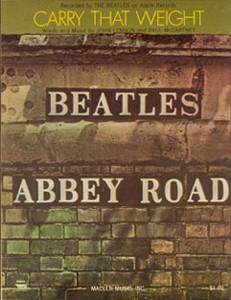
"Carry That Weight" is a song by the English rock band the Beatles from their 1969 album Abbey Road. Written by Paul McCartney and credited to Lennon–McCartney, it is the seventh and penultimate song in the album's climactic side-two medley. It features unison vocals in the chorus from all four Beatles, a rarity in their songs. It is preceded by "Golden Slumbers" and segues into "The End".
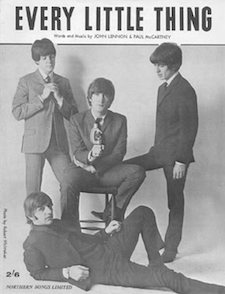
"Every Little Thing" is a song by the English rock band the Beatles from their album Beatles for Sale, issued in the UK in December 1964. Credited to Lennon–McCartney, it was written by Paul McCartney. Capitol Records first issued the song in the US on Beatles VI in June 1965. The track is an early example of the Beatles' use of non-rock instrumentation on a recording, through the addition of timpani drum over the choruses.

"I'll Get You" is a song by the English rock band the Beatles, written by John Lennon and Paul McCartney, and released by the Beatles as the B-side of their 1963 single "She Loves You". The song was initially titled "Get You in the End".

"All Together Now" is a song by the English rock band the Beatles written primarily by Paul McCartney and credited to the Lennon–McCartney partnership. The song was recorded during the band's Magical Mystery Tour period, but remained unreleased until it was included on the Yellow Submarine soundtrack. It was released as a single in 1972 in European countries such as France and Germany, backed by "Hey Bulldog".

"Every Night" is a song by the English musician Paul McCartney, released on his debut solo album McCartney in April 1970. He wrote the song while he was on holiday in Greece, and recorded it at EMI Studios in London on February 22, 1970. McCartney first performed it live on 23 November 1979 in Liverpool.

"Those Were the Days" is a song composed by Boris Fomin (1900–1948) but credited to Gene Raskin, who put a new English lyric to Fomin's Russian romance song "Dorogoi dlinnoyu", with words by the poet Konstantin Podrevsky. The song is a reminiscence of youth and romantic idealism. It also deals with tavern activities, which include drinking, singing, and dancing.
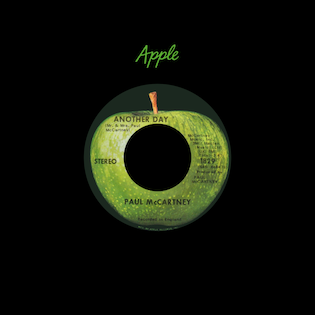
"Another Day" is a song by English rock musician Paul McCartney that was released as the A-side of a non-album single in February 1971. It was his debut single as a solo artist following the Beatles break-up in 1970. McCartney credited his wife Linda as a co-writer on the song, triggering legal action from ATV on behalf of the publishing companies Northern Songs and Maclen Music. The lyrics describe the daily routine of a lonely woman, using an observational style similar to McCartney's narrative in the 1966 ballad "Eleanor Rigby".

James Louis McCartney is an English musician and songwriter. He is the son of singer, songwriter, and former Beatles member Paul McCartney. He has contributed to solo albums by his parents, including Flaming Pie (1997) and Driving Rain (2001) by Paul McCartney, and Wide Prairie (1998) by Linda McCartney. He has released two EPs and three albums. His most recent, Beautiful Nothing, was released on 18 October 2024.

"Band on the Run" is a song by the British–American rock band Paul McCartney and Wings, the title track to their 1973 album Band on the Run.
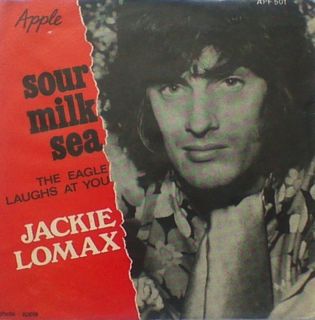
"Sour Milk Sea" is a song written by George Harrison and released by English rock singer Jackie Lomax as his debut single on the Beatles' Apple record label in August 1968. Harrison wrote the song during the Beatles' stay in Rishikesh, India and gave it to Lomax to help launch Apple Records. Lomax's recording is a rarity among non-Beatles songs since it features three members of the band – Harrison, who also produced the track, Ringo Starr and Paul McCartney. Performed in the hard rock style, the song also includes musical contributions from Eric Clapton and session pianist Nicky Hopkins. It was the first of many Harrison productions for artists signed to the Beatles' record label.

"Junk" is a song written by English musician Paul McCartney and released on his debut studio album McCartney (1970). He started writing the song in 1968 with the Beatles while the group were studying Transcendental Meditation in India. After the band's return from India, he recorded a demo of the song at Kinfauns, George Harrison's home, before sessions for The Beatles took place. It was ultimately passed over for inclusion on The Beatles and Abbey Road in 1969. After John Lennon privately announced his departure from the band, McCartney recorded the song for inclusion on McCartney. A slightly longer, instrumental version of the song, titled "Singalong Junk", also appears on the album.

"Goodbye" is a song written by Paul McCartney and performed by Mary Hopkin. It was released on 28 March 1969, and it reached No. 2 in the UK singles chart, prevented from reaching the top position by the Beatles' single "Get Back". In the US, released 7 April 1969, the song reached No. 13 on the singles chart. In the Netherlands and Ireland the single peaked at No. 1.
"The Puppy Song" is a Harry Nilsson song that appeared on his album Harry released in August 1969. Nilsson originally wrote this song at Paul McCartney's request for Mary Hopkin, an 18-year-old singer that McCartney had signed to Apple Records and whose first album, Post Card would feature her version of Nilsson's song. David Cassidy released his version as a double A-side single with "Daydreamer", which reached No. 1 on the UK Singles Chart in 1973.
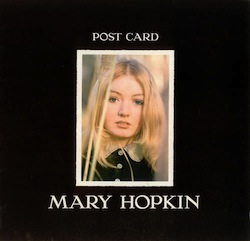
Post Card is the debut album by Mary Hopkin. It was produced by Paul McCartney and released by Apple Records in February 1969 in the UK and in March 1969 in the US. It reached number 3 in the UK and number 28 in the US.

















